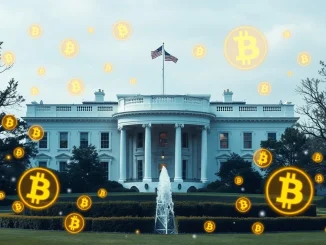
South Korea’s political landscape is witnessing a fascinating shift as the main opposition party, the Democratic Party of Korea (DPK), is making bold moves into the cryptocurrency realm. Are you ready to see how crypto regulations could reshape South Korean politics and the digital asset market? The DPK is not just dipping its toes; it’s diving headfirst into crafting crypto policies aimed squarely at capturing the attention and votes of younger generations. Let’s delve into the details of this exciting development and explore what it could mean for the future of crypto in South Korea and beyond.
Why is South Korea Focusing on Crypto Regulations Now?
The driving force behind this crypto-centric initiative is none other than DPK leader Lee Jae-myung, according to a recent report from Nocut News. His deep interest in digital assets and their potential to resonate with voters in their 20s and 30s is the catalyst for this policy shift. This demographic, often digitally native and keenly interested in new financial technologies, is a crucial voting bloc. By addressing crypto regulations and embracing digital asset innovation, the DPK aims to bridge the gap and connect with younger Koreans on their terms. It’s a strategic move that acknowledges the growing importance of the digital economy and the need for political parties to adapt.
What Crypto Policies are the DPK Considering?
The DPK’s policy committee is actively exploring several key areas within the crypto space. Here’s a breakdown of what’s on the table:
- Spot Crypto ETFs: Perhaps the most attention-grabbing proposal is the potential allowance of spot crypto ETFs. This would be a significant step, mirroring similar discussions and approvals happening globally. Spot ETFs offer investors a regulated and accessible way to gain exposure to cryptocurrencies like Bitcoin and Ethereum without directly holding the underlying assets. For younger investors, this could be an appealing entry point into the crypto market through familiar investment vehicles.
- Regulation of Security Tokens: Another crucial area of focus is the regulation of security tokens. Security tokens represent ownership or rights to traditional assets in a digital format, blending the worlds of traditional finance and blockchain technology. Establishing clear security tokens regulations is vital for fostering innovation and investor protection in this nascent market. This move indicates a forward-thinking approach by the DPK to embrace the evolving landscape of digital assets beyond just cryptocurrencies.
These policy considerations signal a proactive approach to integrating digital assets into South Korea’s financial ecosystem, potentially making it a more attractive destination for crypto innovation and investment.
How Will a Special Committee on Digital Assets Shape South Korea Crypto Policy?
To further solidify their commitment and drive this agenda forward, the DPK is establishing a dedicated special committee on digital assets. Set to launch as early as this week, this committee will be chaired by lawmaker Min Byoung-dug. But what impact can we expect from this committee?
- Focused Expertise: A special committee allows for concentrated expertise and attention on the complex and rapidly evolving world of digital assets. This dedicated body can delve deeper into the nuances of South Korea crypto regulation and policy development.
- Policy Recommendations: The committee will likely be responsible for formulating specific policy recommendations and legislative proposals related to cryptocurrencies, blockchain technology, and other digital assets. Their work will directly influence the direction of DPK crypto policy.
- Stakeholder Engagement: It’s anticipated that the committee will engage with various stakeholders, including industry experts, crypto businesses, and the public, to gather input and ensure a comprehensive and balanced approach to regulation.
- Accelerated Action: The establishment of a special committee signifies a prioritization of digital asset issues within the DPK. This focused structure can potentially expedite the policy-making process and lead to quicker action on crypto regulations.
This committee is a strong indicator that the DPK is serious about its crypto agenda and aims to move beyond just rhetoric to concrete policy changes.
What are the Potential Benefits of DPK’s Crypto Push for Young Voters?
The DPK’s strategy is clearly aimed at engaging younger voters, but what specific benefits could resonate with this demographic?
- Economic Opportunity: Embracing crypto and fostering a thriving digital asset sector can create new economic opportunities for young people in South Korea. This includes jobs in blockchain technology, crypto businesses, and related fields.
- Financial Inclusion: Cryptocurrencies can offer alternative financial avenues for younger generations who may be underserved by traditional financial systems. Spot crypto ETFs, in particular, can make crypto investing more accessible and regulated.
- Innovation and Technology Hub: By becoming a crypto-friendly nation, South Korea can position itself as a hub for technological innovation and attract young talent and entrepreneurs in the digital asset space.
- Alignment with Global Trends: Younger generations are globally connected and aware of the growing importance of digital assets worldwide. The DPK’s crypto-forward approach aligns with these global trends and demonstrates a progressive outlook.
By addressing issues relevant to young voters, the DPK hopes to gain a significant advantage in future elections. The promise of economic opportunity and technological advancement through crypto could be a powerful draw.
Challenges and Considerations for South Korea Crypto Regulations
While the DPK’s crypto initiative is promising, it’s essential to acknowledge the challenges and considerations that come with regulating digital assets:
- Volatility and Risk: Cryptocurrencies are known for their volatility. Regulations must balance investor protection with fostering innovation, ensuring that risks are managed without stifling market growth.
- Global Regulatory Landscape: Crypto regulation is a global issue. South Korea’s approach needs to be mindful of international standards and collaborations to avoid regulatory arbitrage and ensure cross-border compatibility.
- Technological Complexity: Understanding and regulating blockchain technology and digital assets requires specialized knowledge. Policymakers need to stay informed and adapt to the rapidly evolving technological landscape.
- Public Perception and Education: Public understanding of cryptocurrencies is still developing. Education and clear communication are crucial to build trust and ensure responsible adoption of digital assets.
Navigating these challenges effectively will be crucial for the DPK’s crypto policy to be successful and beneficial for South Korea in the long run.
Conclusion: A Bold Step into the Future of Finance?
South Korea’s Democratic Party’s focus on crypto regulations, particularly the exploration of spot crypto ETFs and security tokens, marks a potentially transformative moment for the nation’s digital asset landscape. By directly addressing the interests of younger voters and establishing a dedicated committee, the DPK is signaling a serious commitment to embracing the future of finance. Whether this bold move will translate into electoral success and a thriving crypto ecosystem remains to be seen. However, one thing is clear: South Korea is positioning itself as a nation to watch in the evolving world of digital assets, and the DPK’s initiative could be a game-changer in shaping its trajectory.



